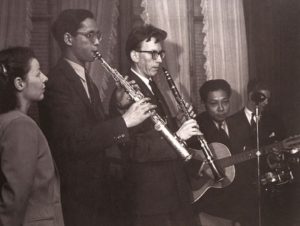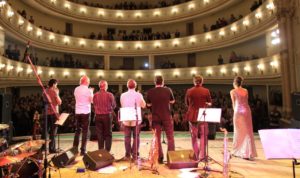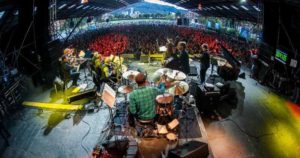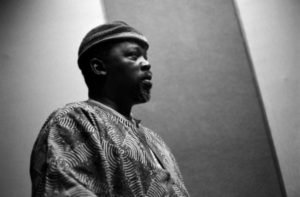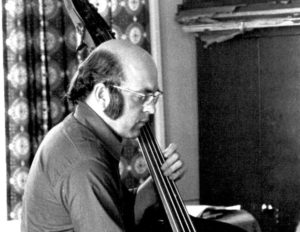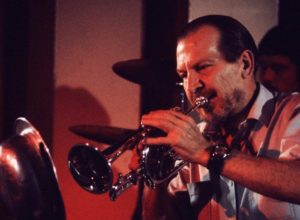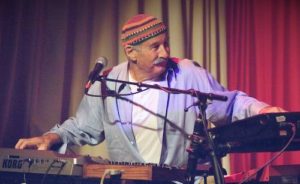Jazz in Pakistan
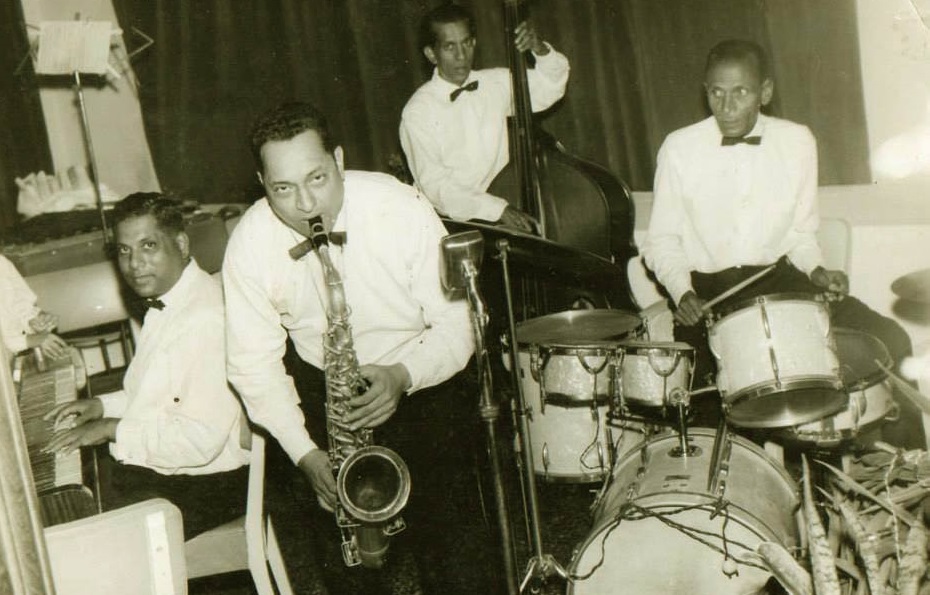
Modern Pakistan became formally independent on 14th August 1947, and jazz was there literally from the beginning, with Bombay-based Anglo-Indian dance band Ken Mac booked to play at the independence banquet for Mohammed al-Jinnah on the night of its founding. Most of the successful dance bands in India of the 1930s were made up of musicians born in India to British families, though there were also Goan musicians, who had learned Western music in a Portuguese-run education system. In these early years, there is not a lot of evidence of jazz played by Muslim Pakistanis, though the music seems to have been tolerated, and occasionally appreciated by the authorities.
Much of Pakistan’s jazz scene has been based around jazz groups that came out of the country’s Portuguese-Goan community. The singer-saxophonist Jannu Vaz‘s band was among the most successful in the 1950s, featuring two saxophonists, Alex Rodrigues and Dominic Gonsalvez, who would remain a key part of the jazz scene in Pakistan for decades. Rhythm Swingtette, built around the brothers Joe and Pat D’Cruz, were another. Sadly, neither band appear to have recorded.
Two US state department jazz tours passed through Pakistan in the late 1950s. The first was Dizzy Gillespie’s Orchestra in 1956. The National Museum of African American History & Culture has a photograph, taken in Karachi, of Gillespie playing trumpet, while members of the Rhythm Swingtette look on. Certainly, I’m sure Gillespie influenced a generation of young musicians, and on this tour he made every effort to ensure that audiences were not just constituted of government officials or foreign business people and ambassadors. The trumpeter himself took inspiration from the music he heard on the streets, and the following year he would record ‘Rio Pakistan’ with violinist Stuff Smith, a tune he wrote inspired by scales he had learned in Karachi.
In 1958, Dave Brubeck, brought his quartet to Pakistan courtesy of the US state department. At the concert in Denso Hall in Karachi, Dominic Gonsalvez had the chance to play with Brubeck (he would also get to play with the Duke Ellington Orchestra during that band’s 1963 state department tour). In the audience for Brubeck’s Lahore show, was a young boy Izzat Majeed, who fell instantly in love with jazz, and after a successful career in business, found a productive way to invest his money in a passion project – the Sachal Studios Orchestra. In the audience for the Ellington show was Bangladesh-born tabla player Badal Roy, who grew up in Pakistan.
Under General Muhammad Zia-ul-Haq, Pakistan’s president from 1978 to 1988, who came to power in a coup d’etat, the country saw a period of ‘Sharization’. The introduction of Sharia laws, saw the closure of nightclubs, alcohol bans and attempt to decry Western culture and music. Jazz and its exponents retreated to international hotels. Alex Rodrigues for example, would play in a jazz trio with guitarist Ralph D’Aranjo at the Hotel Intercontinental in Karachi, until shortly before his death in 2001. His good friend Dominic Gonsalves would replace him until he emigrated to Australia in 2005.
During the early 1970s, Pakistan’s film industry had been the fourth largest in the world. Under Zia and new censorship laws the late 1970s saw many of Pakistan’s classical musicians also newly under- if not un-employed. It was from this pool of musicians that Izzat Majeed and composer/violinist Riaz Hussain put together a group of virtuoso musicians with decades of experience as session musicians in Lahore’s film studios (nicknamed ‘Lollywood’). Majeed sponsored the creation of the Sachal recording studios, and bought instruments for those musicians who needed them. Hussain then wrote arrangements of a number of jazz standards featuring sitar, tabla, and the classical string players, for a 2011 album called ‘Sachal Jazz’. A version of Dave Brubeck’s ‘Take Five’ from the album hit number one on the iTunes jazz chart, and was heard and appreciated by Brubeck shortly before his death. The Sachal Ensemble‘s international success led to appearances in France, Japan, and at the Royal Albert Hall in London, and the Lincoln Center in New York with Wynton Marsalis. We can hope that this international interest might lead to a new Golden age of jazz in Pakistan.
The live music scene in Karachi has been documented in some detail by the website lmkonline, with a particular focus on the Goan community. I grabbed the photo of Dominic Gonsalvez’s band from there. They have a lot more great pictures on their site.
